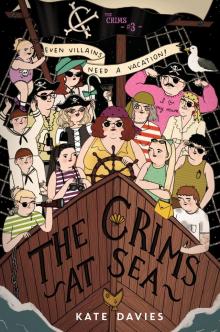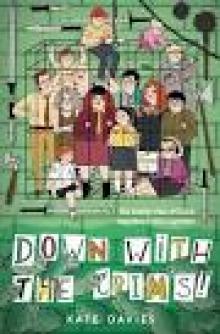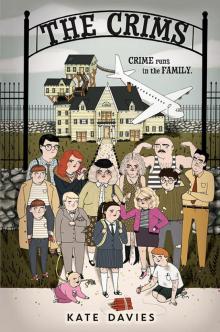- Home
- Kate Davies
The Crims Page 9
The Crims Read online
Page 9
The supposed victim of The Heist: Jack Wooster.
And then she remembered something Big Nana used to say: “Don’t feel sorry for the victim until you’re sure they didn’t commit the crime themselves. Except murder victims. They’re usually innocent.”
Maybe it was time to pay Jack Wooster a little visit.
JACK WOOSTER LIVED in a huge gated mansion on a high hill above Blandington. He had made his fortune founding WoosterLoos, a company that made surprisingly comfortable portable toilets, and there was no escaping this fact if one visited his home. His crest, which was plastered all over the building, showed a lion and a unicorn fighting over a huge golden portaloo, and his gardens featured a waterfall designed to look like a roll of toilet paper spilling down the hill.
Imogen had actually visited Wooster Mansion—once, during a supposed truce between Jack and Uncle Clyde. Jack had invited the Crims to a (very posh) barbecue. Halfway through lunch, Uncle Clyde had excused himself to go to the bathroom. He was gone for quite a while, but everyone just assumed he was trying out all the special features on Jack’s personal, customized WoosterLoo—it was made of titanium, and when you sat down, it assessed your mood (based on your body temperature) and played you an appropriate piece of classical music. Then it sprayed you with perfume. Then it suggested new hairstyles you might like to try. And then (if you hadn’t yet run away screaming) it tried to interest you in a one-toilet play it was writing called Lavatories Get Lonely, Too. Anyway, when Uncle Clyde stumbled back out to the gardens, it was clear that he hadn’t been to the bathroom at all. Because if he had, he’d have looked in the mirror, and he’d have seen that his hands and his face were covered in bright-blue dye.
The other Crims gasped when they saw him—they’d taken part in enough failed bank robberies over the years to know what the blue dye meant. It was the sort of dye that banks plant in stolen money to stain the thief’s hand and mark them out as a crook. Jack Wooster had obviously decided to use the same dye to protect his precious lunch box.
Uncle Clyde denied trying to steal the lunch box, of course. He claimed he was blue because he had dressed up as a Smurf as a special treat for Big Nana. But Jack Wooster wasn’t having any of it. He stood up and made the most unpleasant speech anyone has ever made while holding a champagne flute. He talked about how the Crims could never be trusted and how they were all as bad as one another and how Uncle Clyde had just proved that no one should ever be given a second chance. When he’d finished speaking, the family was forced out of the house by security guards in black jackets with golden toilets embroidered on the back.
The whole thing had been horrible and humiliating. Imogen twitched a little bit whenever she thought about it. She’d never been able to bring herself to use a WoosterLoo again, which made going to outdoor events a bit tricky.
Thinking back to the barbecue now, Imogen felt embarrassed. She realized she empathized with Jack Wooster. He was a respectable businessman who respected law and order. He was a self-made billionaire who wasn’t ashamed of the way he’d earned his money (quite the opposite, in fact, judging by his toilet-themed mansion). He was a generous, forgiving person who had tried to make peace with Uncle Clyde—and Uncle Clyde hadn’t been able to put aside his petty jealousies and mad lunch box–obsession for two hours to enjoy a barbecue. She imagined that Jack Wooster’s annoyance with her family was similar to what she felt, sitting in the jail cell, trying to convince them not to take credit for a crime they didn’t commit.
Maybe we understand each other, Jack Wooster and I.
Now Imogen stood outside the gates of Wooster Mansion. She was wearing a scarf and sunglasses to make herself look older and richer and generally more like the sort of person who might be welcome there. She pulled herself up to her full height and put out her hand to buzz on the intercom—but then she hesitated. Her heart was thudding. It had been two years since she’d last worn a disguise and sneaked into someone else’s house. She didn’t know if she still had it in her. Come on, Imogen, she told herself. You can do this. You’re not really committing a crime; you’re trying to prove that someone else has committed a crime. She pressed the button on the intercom.
“Wooster residence, how may I help you?” crackled a deep voice.
Imogen opened her mouth to speak, but no sound came out.
“Hello?” said the deep voice again.
“Hello there,” said Imogen. She tried to speak with purpose, like a Future World Leader, but her voice was wavering. “Imogen Collins here, reporter from the Blandington Times. I’ve come for my three o’clock interview with Mr. Wooster.”
“There’s no record of an interview scheduled for today,” said the crackling voice.
“Are you sure?” said Imogen, playing for time. Why hadn’t she thought about what she’d say next?
“I’m sure,” crackled the voice. “If that’s all—”
“Wait!” said Imogen. “I—I do hope Mr. Wooster hasn’t forgotten. The interview is going to be a lead feature in next Saturday’s edition.”
“You arranged the interview with Mr. Wooster directly?” said the voice.
“That’s right,” said Imogen, beginning to get in her stride. “He wanted to talk about the theft of his lunch box and see if the public had any leads on its whereabouts. So will you let me in, please? You know how Mr. Wooster hates to be kept waiting.”
There was a silence.
Imogen held her breath.
Finally, the voice said, “All right, then,” and the golden gates began to open, glinting expensively in the sunlight.
Imogen walked up the path to the mansion itself, past sculptures of cupids spraying air freshener and Greek gods drying their hands on premium WoosterLoos hand towels. The path was unnecessarily long, and Imogen had broken into a sweat by the time she got to the front door, which swung open before she could knock. On the doorstep stood a butler in a black tuxedo. He bowed to Imogen. “Through here, Miss Collins,” he said, leading the way to a book-lined study.
Jack Wooster was seated at a desk with his back to Imogen. He waved her inside. “Sit on the comfortable armchair,” he said.
Imogen tried to work out which armchair he meant. There were two of them—a squishy-looking purple one and a stiff-looking red velvet one. Imogen chose the purple one. As soon as she sat down, she realized she’d chosen the wrong one. The seat seemed to be full of pins.
Jack swiveled his chair around to face her. He was wearing a wine-colored dressing gown and monogrammed slippers, and he was smoking a pipe, like rich men do. He looked older and more tired than when Imogen had last seen him.
He wasn’t smiling.
“I didn’t have an interview scheduled for today,” he said.
“Perhaps you forgot,” Imogen said, shifting on the uncomfortable chair.
“I don’t forget things,” said Jack, studying Imogen. “Particularly not faces.”
Imogen’s heart began to thud again, and she pulled her scarf closer around her face. “I promise this won’t take up much of your time,” she said, pulling a Dictaphone from her pocket and pressing record. She hoped Jack Wooster couldn’t hear the nervousness in her voice. “I’m here to talk to you about the theft of your lunch box. It must be very traumatic to have someone break into your house and steal such a prized personal possession.”
“Very,” said Jack, puffing on his pipe.
“Do you remember when you first realized that the lunch box was gone?”
Jack leaned forward to look at Imogen more closely. “Aren’t you a little young to be a reporter?” he asked.
“No,” she said, drawing away from him. “I used to work on the beauty pages, and I got a lot of free samples of very powerful anti-aging cream.”
“I see,” said Jack, leaning back in his chair and crossing his legs. “You look familiar, that’s all.”
“Maybe you’ve read my column—Blandington Bridge Watch? I watch all the bridges in Blandington and write about the things that happen
on them.”
“No,” said Jack. “That’s not it. I’ve definitely met you before. What’s your surname again?”
“Collins,” said Imogen, more squeakily than she’d meant to.
Jack Wooster put down his pipe and leaned toward her again.
“Are you sure?” asked Jack, studying her face. “Are you sure your name isn’t . . . Crim?”
Imogen felt as though she’d been punched. She was out of practice, clearly, but still: No one had ever seen through one of her disguises before. Once, she had convinced an entire retirement luncheon’s worth of knife salesmen that she was Margaret Thatcher. When she was seven.
But what if she’d lost her gift? What if, after two full years on the straight and narrow, she was as useless, criminally speaking, as Aunt Bets’s knitted handguns?
Her heart sank at the thought. If she couldn’t even pull off a simple disguise, how was she ever going to prove that her family was innocent?
She took off her glasses and scarf, completely defeated. “Fine,” she said. “You win. I’m Imogen Crim.”
“I knew it,” Jack said triumphantly.
“Look,” Imogen pleaded, hoping that Jack would understand the strange kinship they shared in annoyance levels with her family. “I just have a few questions to ask you about The Heist—”
But Jack laughed at her. “What—Clyde didn’t tell you what he did with the lunch box? You want to know where it is so you can get your filthy hands on it?”
“My hands aren’t filthy,” said Imogen, stung. “I washed them just before I came out.”
“With WoosterLoos antibacterial hand wash?”
“No. With soap.”
“My point exactly,” said Jack, looking her up and down. “Do you really think I’m going to help you? I’d sooner travel by public transport than help a Crim! I’d sooner go to a pop concert! I’d sooner buy clothes from a thrift store! I’d sooner lick a rat!”
“Please,” said Imogen, willing herself not to cry. She could feel Lilyworth moving farther and farther away. “I’m not asking for much—just yes or no answers. I know you wouldn’t really rather lick a rat—”
“Yes I would!” shouted Jack Wooster, standing up and towering over his desk toward her. “At least rats have some integrity! At least they are who they say they are! At least they aren’t lying, cheating, thieving pond scum!”
“That’s very harsh,” said Imogen, feeling a bit wounded in spite of herself. She’d known that Jack Wooster hated the Crims, of course, but she was a bit surprised by the ferocity of his hatred.
“You’re right,” said Jack, standing up. “It’s not fair to pond scum. You’re all worse than pond scum! Clyde is getting exactly what he deserves. And so will you when I call the police and tell them that you’re TRESPASSING ON MY PROPERTY!” He pointed to the door. “GET OUT!” he spat (literally—Imogen had to wipe her face with her scarf).
Imogen was desperate—she couldn’t leave without answers. This was her best chance to find out whether Jack had faked The Heist to get revenge on Uncle Clyde—or whether someone else had set her family up. “Please let me explain—” she said, standing up.
But then Jack started marching toward her, and she had to stagger backward to get out of his way.
“OUT!” said Jack, pushing her toward the door.
Jack Wooster chased Imogen out of his office and through the hall, and kicked her out of the front door—so hard that she flew through the air like a bird (a flightless one) and landed with a thud on the lawn.
She stumbled to her feet, outraged. Well, she thought. I may have tricked my way into his house, but he didn’t need to treat me like that. Clearly she had been wrong to imagine that she and Wooster were anything alike. He was a snobbish, cantankerous rich person—and she was a Crim. She realized in that moment that she always would be, to some people—despite her best efforts to forget it.
She rubbed herself where Jack had kicked her and smoothed down her hair, which felt frizzy and out of control, like everything else in her life. She started to limp down the long path that led out of the mansion, hot with humiliation. That could have gone worse, she said to herself. Jack could have killed me or set his dogs on me or something. Except that only happens in movies.
Which is when she heard the barking.
Imogen turned around to see five of the biggest, muscliest, angriest-looking dogs she’d ever seen running toward her, licking their pointy teeth and dribbling aggressively.
Imogen ignored her limp and began to run, harder than she’d ever run before and then a little harder than that, forcing her legs to take huge strides. . . .
But the barking and snarling and dribbling was getting closer and closer. . . .
She didn’t dare look behind her. Instead, she focused on the huge golden gates in front of her. Just a few more steps and she’d be safe.
But one of the dogs was at her ankles. . . . She could almost feel its slippery, sharp teeth on her skin.
In the split second before the dog could sink its teeth into her leg, Imogen threw herself at the gate and forced it open. She slipped through and slammed it shut, so that when the dogs hurled themselves at her, they hit the gates with a thunk instead and slid to the ground, dazed.
Imogen collapsed to the ground on the other side, gasping for air. She’d had many low points in recent days, but this—sitting on the ground, her clothes a mess, dog drool on her leg, humiliated by her family’s archenemy—might just be the worst moment of her life. And I didn’t even get any information out of him!
Imogen stumbled home, so humiliated she could barely lift her eyes from the pavement. She kept replaying the scene with Jack Wooster, thinking of clever comebacks she could have said, trying to work out when he’d first realized who she was, thinking of what she’d do differently next time. But there wouldn’t be a next time. She’d blown her chance. Now she didn’t have much time left to solve the mystery of The Heist and get back to Lilyworth.
Thinking about school gave her a pang. Nobody would ever speak to her there the way Wooster had just spoken to her in his study. She had friends and good test scores and a tasteful array of twinsets and a real future ahead of her—everybody said so.
In Blandington, she was just one more failure in a family of failures. Jack Wooster’s words went around in her head like a horribly catchy Kitty Penguin song: “You’re all worse than pond scum!”
But as she replayed his words, an unfamiliar feeling washed over her—something she rarely felt at Lilyworth. Her humiliation hardened into something more satisfying: cold, steely, righteous anger.
Wooster was the pond scum! She reminded herself why she’d gone there in the first place: She suspected he was the one who had stolen his own priceless lunch box to set up his unfortunate, defenseless former best friend, just to settle a grudge!
No, she didn’t feel sorry for Jack anymore. They were nothing alike. She felt sorry for Uncle Clyde instead. No wonder he hated Jack so much. Jack Wooster was a pretentious, velvet-wearing, toilet-loving monster. How dare he treat her like that?
Because he could, Imogen realized. Because the police would always take his side over hers. And because technically, she had been trespassing on his property.
He deserves to have his lunch box stolen, Imogen thought, her pulse quickening. She took in a deep breath and turned toward home, invigorated by her anger. She’d figure out a way to get to him. I just need more time . . . and perhaps a farm animal.
For the first time in a long time, she felt like a Crim.
Crim House was eerily silent as Imogen opened the front door. Usually, when she came home, she was greeted by the sound of a brick (or a cat or a child) being hurled from a top-floor window, but that afternoon she couldn’t hear anything except a bird in a nearby tree halfheartedly whistling its usual, boring tune. But as she hung up her coat, she heard a strange sound coming from the living room—something tuneful, something gentle, something completely and utterly un-Crim-like. She pushed
open the door, and there, huddled on the sofa, were the Crim children, holding mugs of cocoa and . . . singing.
Imogen couldn’t quite believe her eyes, so she closed them, but when she opened them the children were still there, smiling and sitting upright and watching Mrs. Teakettle, who Imogen now noticed in the middle of the room. She appeared to be conducting the children, who were singing in tune.
“There’s a strange kind of clanging from the chains on our legs
And the bells in the jailhouse, too.
And up in the court, a nasty judge with a grudge
Has sentenced us to one to two (years).”
Mrs. Teakettle, still conducting the children, turned to Imogen and whispered, “The rhyme scheme needs a little work.”
Imogen nodded, dazed, and then watched as Delia stood up to sing a solo:
“Good night, my friends, it’s time to say good-bye,
I’ll probably be in prison till I die.”
“That’s right,” said Mrs. Teakettle, smiling. “That’s what’ll happen if you don’t stop stealing motor vehicles!”
The twins stood up next, looking disturbingly angelic, like something out of a horror film.
“We’re sleepy now. We bid you all good night,
We’re off to jail for getting into fights.”
“Very good, my dears,” said Mrs. Teakettle. “Now, you, Sam.”
Sam stood up, and at the top of his lungs, screeched, “Good-BYYYYYYYYE!” so loudly that everyone else had to cover their ears, and Isabella, who had been calmly riffling through Mrs. Teakettle’s handbag, began to cry and bang her fists on the floor. Imogen didn’t blame her.
“That’s enough for today, I think,” said Mrs. Teakettle. She turned to Imogen, who was still staring, openmouthed, at the scene before her.
“Now, Imogen, dear, I need to be off—I have a church function this evening. And I can’t find Freddie anywhere. Would you mind looking after the children till he turns up?”

 The Crims #3
The Crims #3 In at the Deep End
In at the Deep End The Crims #2
The Crims #2 The Crims
The Crims Take a Chance on Me: Lessons, Book 4
Take a Chance on Me: Lessons, Book 4